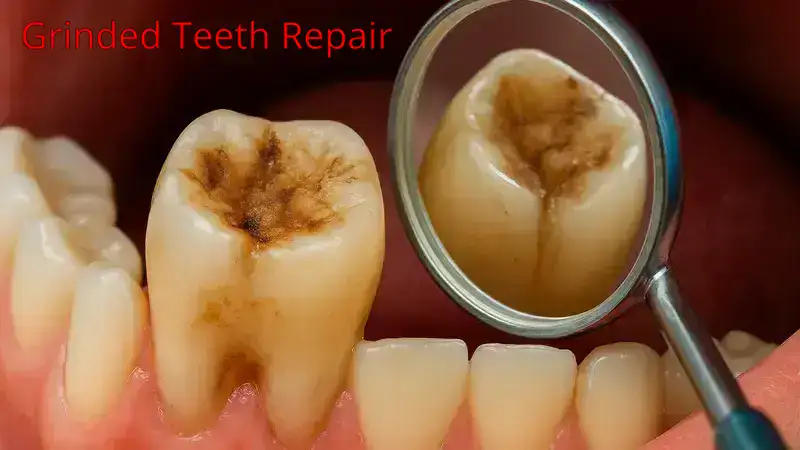Teeth grinding, also known as bruxism, can lead to severe damage to your teeth. It often occurs during sleep but may also happen during waking hours due to stress, anxiety, or misalignment of teeth. If left untreated, bruxism can cause cracked, chipped, and worn-down teeth, resulting in discomfort and even tooth loss. In this article, we’ll explore effective solutions for grinded teeth repair, providing you with essential knowledge to protect your dental health.
What is Teeth Grinding (Bruxism)?
Teeth grinding, or bruxism, is the involuntary act of grinding, clenching, or gnashing your teeth. Most people grind their teeth during sleep without realizing it. However, bruxism can also occur when you are awake, especially in response to stress or anxiety. Over time, this constant pressure can cause significant damage to your teeth and jaw muscles.
Signs of Teeth Grinding
People who suffer from teeth grinding may experience several signs. These include:
-
Worn-down teeth
-
Jaw pain or soreness
-
Frequent headaches
-
Sensitivity to hot and cold foods
-
Cracked or chipped teeth
-
Stiffness in the neck and shoulders
If you notice any of these symptoms, it’s important to seek professional help for grinded teeth repair.
Causes of Teeth Grinding
Several factors can contribute to teeth grinding. Stress, anxiety, and sleep disorders are among the leading causes. Other factors include:
-
Misaligned teeth
-
Medical conditions, such as Parkinson’s disease or epilepsy
-
Medications, particularly those that affect the nervous system
-
Lifestyle habits, including alcohol consumption and smoking
Understanding the cause of your teeth grinding is essential in determining the best course of treatment for grinded teeth repair.
How Teeth Grinding Damages Your Teeth
Constant grinding and clenching can lead to serious dental issues. When your teeth grind together, the enamel wears away, making them more susceptible to damage. Here’s how teeth grinding affects your dental health: Visit WORLD JOURNEY MAGAZINE for more details
-
Enamel Erosion: The protective enamel on your teeth wears away, leading to sensitivity and increased risk of cavities.
-
Cracked and Chipped Teeth: Excessive pressure can cause teeth to crack or chip, which may require restorative treatments.
-
Jaw Pain and TMJ Disorder: Continuous grinding can strain the jaw muscles and joints, leading to pain and temporomandibular joint (TMJ) disorder.
-
Headaches and Facial Pain: The constant tension in your jaw can cause headaches and pain in the face and neck.
Grinded teeth repair aims to address these damages and restore your smile.
How to Prevent Teeth Grinding
Preventing teeth grinding is the first step in grinded teeth repair. While it’s not always possible to stop bruxism completely, the following strategies can help minimize the damage:
1. Use a Night Guard
A night guard is a device worn over your teeth while you sleep. It acts as a barrier, preventing your teeth from grinding against each other. A custom-made night guard can help reduce the pressure on your teeth and jaw, offering relief from the symptoms of bruxism. If you grind your teeth at night, this is one of the most effective ways to protect your dental health.
2. Manage Stress and Anxiety
Since stress is a leading cause of teeth grinding, learning to manage it can help reduce grinding. Consider practicing relaxation techniques such as meditation, yoga, or deep breathing exercises. If anxiety is a significant issue, talking to a therapist or counselor may also help.
3. Correct Misalignment of Teeth
If misalignment is contributing to your bruxism, orthodontic treatment may be necessary. Braces or other corrective procedures can help realign your teeth, preventing the grinding action.
4. Limit Stimulants
Certain substances, like caffeine and alcohol, can increase the likelihood of teeth grinding. Limiting your intake of these can help reduce the frequency of grinding episodes, especially before bedtime.
Grinded Teeth Repair: Available Treatment Options
When bruxism has caused significant damage to your teeth, restorative dentistry procedures can help. These treatments are designed to repair the damage caused by grinding and prevent further issues. Here are some of the most common grinded teeth repair procedures:
1. Dental Crowns
Dental crowns are caps that cover damaged teeth. They are customized to fit over the tooth and restore both function and appearance. Crowns are often used to repair teeth that have been severely worn down or cracked due to grinding. They help protect the underlying tooth structure and prevent further damage.
2. Veneers
Porcelain veneers are thin shells that are bonded to the front of your teeth. They can effectively cover chips, cracks, and wear caused by teeth grinding. Veneers provide a natural-looking solution to restore the appearance of your teeth. They are most commonly used for the front teeth, as they enhance both the aesthetic and functional aspects of your smile.
3. Bonding
Dental bonding involves applying a tooth-colored resin to the damaged teeth. The resin is shaped to match the natural contours of your teeth and then hardened with a special light. Bonding is a less invasive and more affordable option for minor damage caused by teeth grinding. It’s suitable for those who need small repairs, such as filling in cracks or chips.
4. Root Canal Therapy
In some cases, bruxism can cause severe damage to the tooth pulp, leading to infection. A root canal may be necessary to save the tooth. During the procedure, the infected pulp is removed, and the tooth is sealed. Afterward, a dental crown is typically placed to protect the tooth.
5. Jaw Treatment
If teeth grinding has led to jaw pain or TMJ disorder, treatment may be required to address these issues. A dentist may recommend physical therapy, medications, or even surgery in extreme cases to help relieve pain and restore proper jaw function.
Why You Need to Grinded Teeth Repair
If you don’t address teeth grinding early, the damage to your teeth and jaw can worsen over time. Here are some reasons why you need to treat grinded teeth:
-
Prevents Further Damage: Grinded teeth repair can stop the progression of tooth wear, protecting your teeth from more severe damage.
-
Reduces Pain: Treating the root cause of your bruxism can help alleviate pain and discomfort in the jaw, teeth, and head.
-
Improves Appearance: Restorative treatments can restore the look of your teeth, making your smile healthier and more attractive.
-
Preserves Dental Function: Repairing the damage caused by grinding ensures that your teeth can continue to function properly for chewing and speaking.
My Final Thoughts
Grinded teeth repair is essential for maintaining your dental health if you suffer from bruxism. The damage caused by grinding can lead to significant issues, including worn-down teeth, jaw pain, and headaches. Fortunately, various restorative dentistry procedures, such as crowns, veneers, and bonding, can repair the damage and restore your smile.
By taking steps to manage stress, wear a night guard, and seek professional treatment, you can prevent further damage and improve your oral health. If you’ve noticed any signs of teeth grinding, consult with your dentist to explore the best options for grinded teeth repair.



